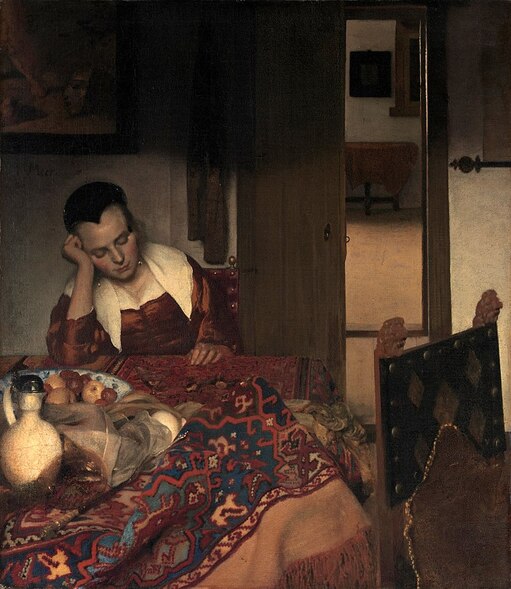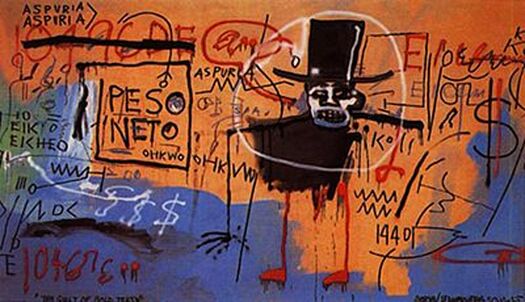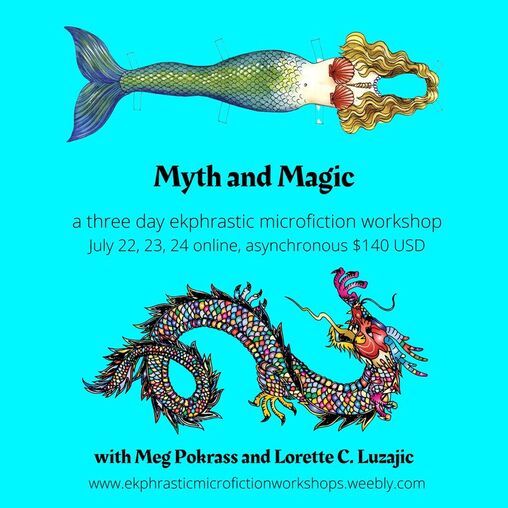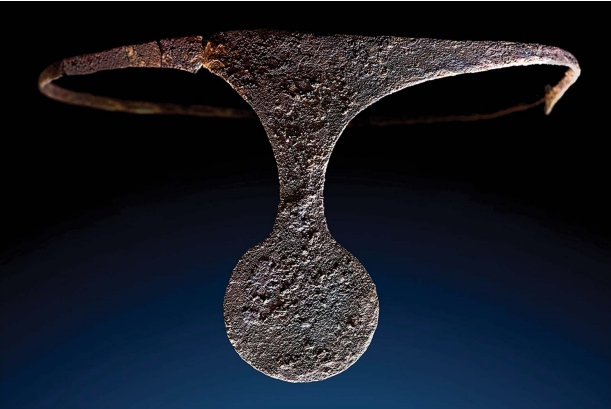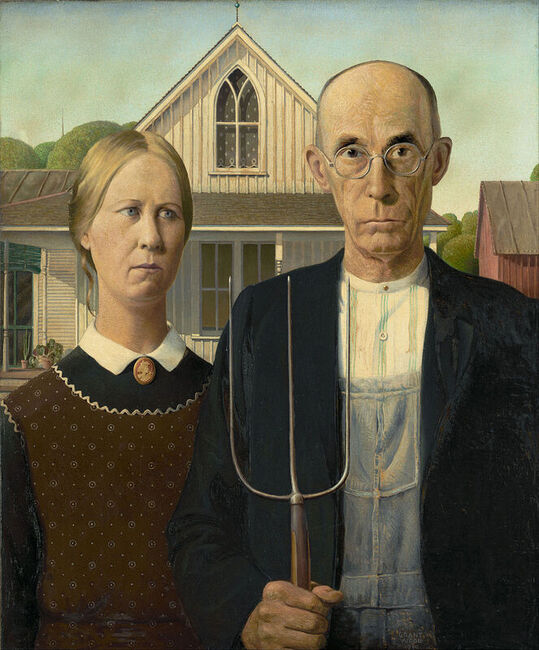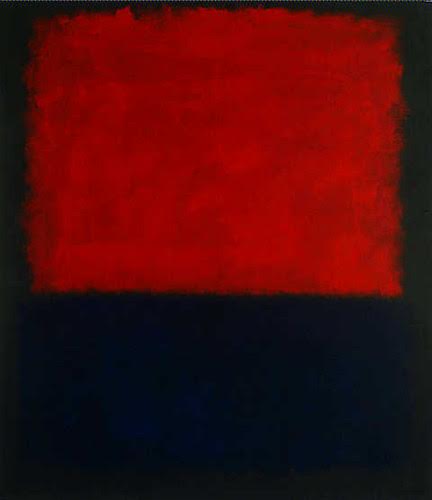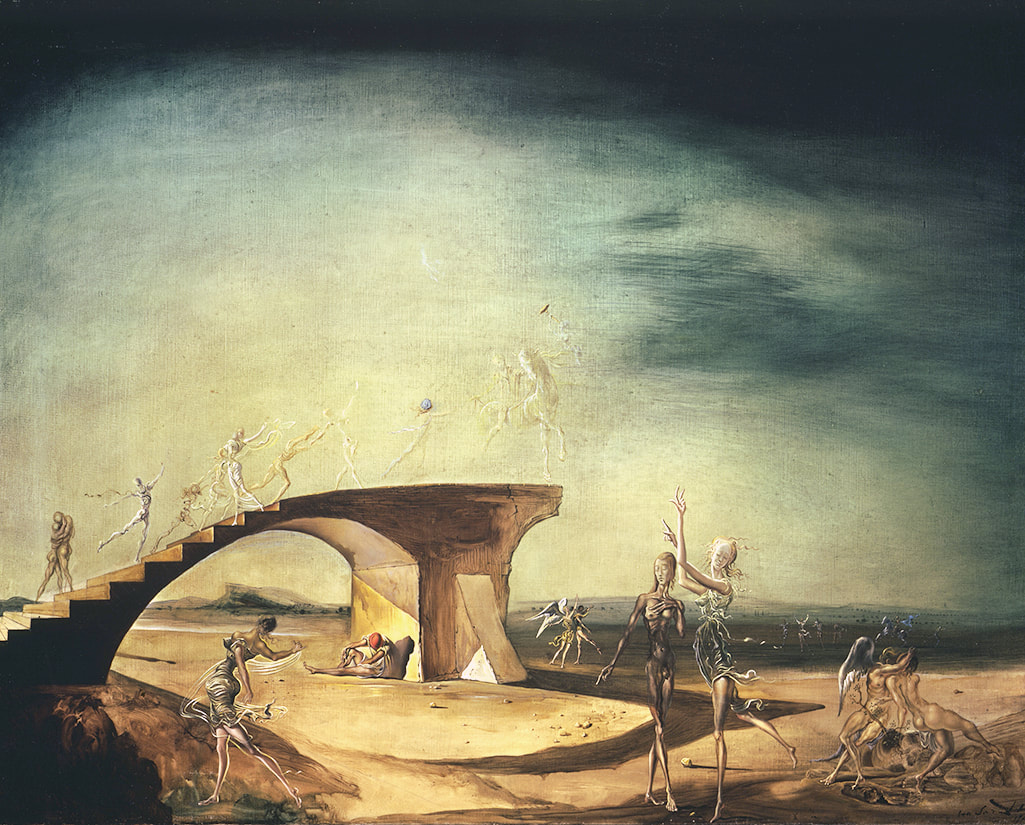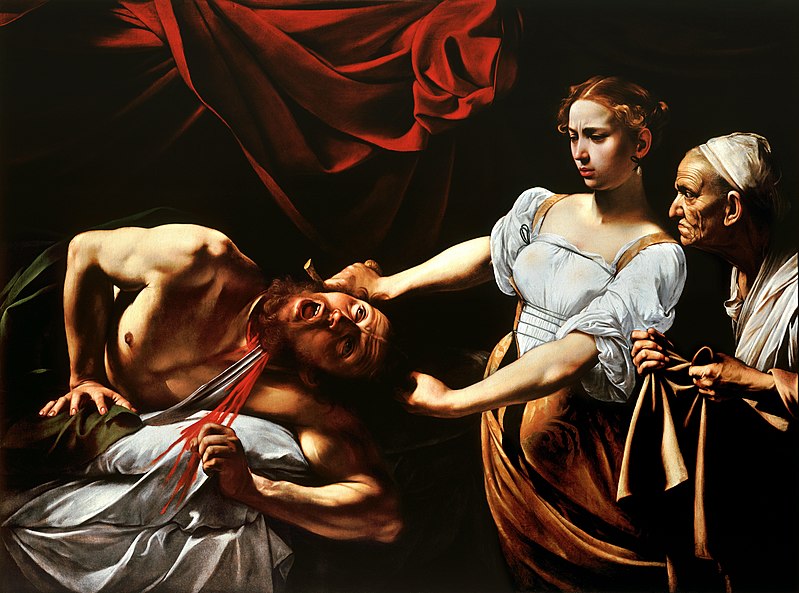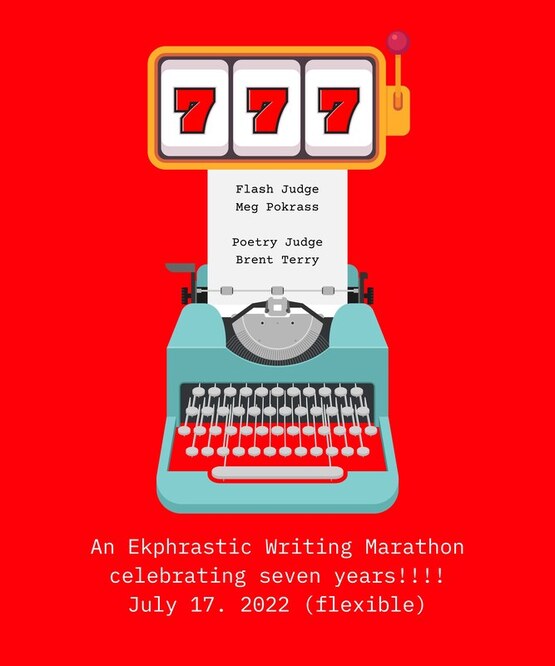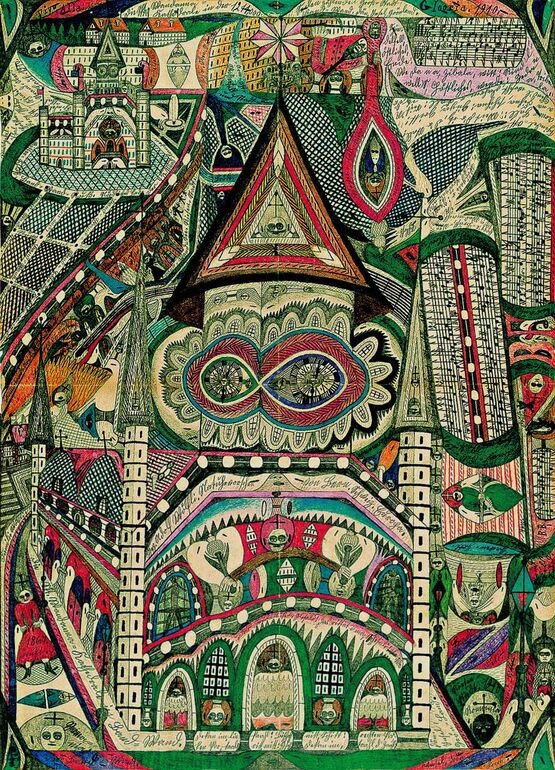|
Ask Her The door is half open to someone else’s life and everything on this side divides evenly: wall split by shadow, table almost tidy, glass nearly empty, and girl in between-- her warm skin a faience pitcher, the apple of her cheek a sign of fever, one china hand ready to answer the sudden summons of her master. Maybe she shirks her parlor duty to dream of something far away, leaving her station, refusing to stay in this world, wandering to another as she drowses in a secret corner, sheltered from the golden light, her rampart a high-backed chair and a Turkish rug, and a private despair. Or maybe she doesn’t dream at all. Dressed in lace and felt, a satin swelter, maybe her beauty is peace, her stillness rest, and there’s nothing but heat to blush her. John Tessitore John Tessitore has been a newspaper reporter, a magazine writer, and a biographer. He has taught British and American history and literature at colleges around Boston and has run national policy studies on education, civil justice, and cultural policy. Most recently, he has published poems in the American Journal of Poetry, Canary, The Wallace Stevens Journal, and forthcoming in Wild Roof and the Sunday Mornings at the River anthology.
0 Comments
Aspuria I’m wearing my Black hat. I’m the skeleton man. I got a wide mouth, & square teeth Like wood dentures. I’m in Gumbo land-- My scarecrow legs can’t stand. I’m stung stoned-- I got strange arms & spider fingers With No palms, but they take me walking. & my emaciated eyes tell me My jail cell number is E10467E-- So, I drip, drip, paint on canvas & My gold-teeth guilt bedraggles me. I see a White-Faced Death-- The funeral caretaker is watching me. I got an Al Jolson face, Heroin legs & skinny, bloody feet. It could be the year 1440, or 1441. I’ll figure out later which. The birds fly sleeping-- So, money is shit in red & black. I am the rebel @ Ang. White faces nose around me. Picasso would have let me breathe-- & Give me money, money, money, & Give me peso, peso, peso, All I remember is Neto, Neto, Neto. Lisa Rhodes Ryabchich Lisa Rhodes Ryabchich teaches poetry and screenwriting at Westchester Community. She is the author of poetry manuscripts Breaking Out of the Cocoon, 2021, Opening the Black Ovule Gate, 2018, and We Are Beautiful like Snowflakes, 2016 all from Finishing Line Press (http://www.finishinglinepress.com). She has two poetry manuscripts with CyberWit.net. Her poems are published or forthcoming in numerous journals, including Driftwood, Artemis, Medical Literary Messenger, Dash Literary, and elsewhere. She has an MFA from Sarah Lawrence College and was a 2016 fellow with Marthas Vineyard Institue of Creative Writing. She lives in Piermont, N.Y. with her wheel-chair bound teenage daughter. Her poetry blog and performance schedule is https://www.lisarhodesryabchichpoetryblog.Wordpress.com Just a couple spots left!
Join Meg and Lorette on a journey to explore myth, magical realism, surrealism, and the fantastical in microfiction. We will look at artworks with myth and magic, and let our imagination take over as we write our stories. Click here to sign up for Myth and Magic! Click on image to see our new Ekphrastic Microfiction website! Microfiction legend Meg Pokrass and The Ekphrastic Review's editor Lorette C. Luzajic have been teaching ekphrastic microfiction workshops together now for over a year. They are an amazing, dynamic experience. We both adore shaping and sharpening your small stories and seeing them out in the world in journals everywhere. We have a different theme every time, and use inspiring artworks and other prompts to surprise your creativity into action. Workshops are generative and asynchronous- you write every day at your own pace. We all meet inside a Facebook page to discuss, share, give feedback and suggestions, laugh and connect. "I cannot recommend Lorette and Meg's courses highly enough... a dream team!” Jane Salmons, author, The Quiet Spy La Almoloya, Grave 38 The silver diadem set upon your head four thousand years ago marked you graced you sparked you with sunlight When you strode into your palace hall your silver earrings chimed with wind song When you raised your arm, the clang of your heavy sterling bracelets called your parliament to order Your riches surprise the diggers Silver cups for drinking wine a silver dagger near to hand to greet assassins Your bones surprise the scholars Entwined with your consort You embrace your infant’s father the scarred warrior who rode into battle at your command You ruled not he Iberian queen Your tarnished crown transfixes The fragments of your life pitted and seared illuminate enthrall ignite Questions You left no hieroglyphs, no runes no epic saga But the touchstones of your life shimmer charge the air After your burial Your settlement burned Your people scattered from the mountain top vanished Were they lost without you? Elizabeth Fletcher Click here to learn more about this artwork and its archeology. Elizabeth Fletcher’s poems have appeared or are pending in the Ekphrastic Review, The Schuylkill Valley Journal, the Muddy River Review, October Hill, The Dillydoun Review, Ariel Chart, and Tiny Seed Literary Journal, among others. She has been nominated for a Pushcart Prize. Her nature essays on snowy owls and sea turtles have appeared in The Philadelphia Inquirer and she is co-author and author of medical education research publications. She has a BA in English and writing from Hamilton College and an MS in Technical Writing from Drexel University. Impressions of the Couple in American Gothic Rigid and righteous come to mind, a rectitude unbending. The children under their domain lived constant reprimanding. Insolence or levity was cause for nip-in-budding; obey, and eat the Lord's hard bread but seldom, pleasure's pudding. Did high lace collar, sober dress hide bosom-heave of passion, or did mere thought of hand-on-breast hold tincture of transgression? Feed the hogs and shuck the corn; at dusk and dawn, the milking. Hoe and bake and scour and weed. Relaxed was time for quilting. The Bible, Farmer's Almanac, his pipe, her constant mending forged taciturn companionship, their dusty decades binding. We parody such rectitude; perhaps we've grown too mellow, once moral terra firma changed to quiverance of jello. Lark Beltran Lark Beltran, originally from California, has lived in Lima, Peru for decades as an ESL teacher. Many of Lark's poems have appeared in online and offline journals. Colour Field The sky is a burnt Rothko red against the black hill a region of cruel colour in a darkening world but it doesn’t help to think about 70s pastels the yellow crepe paper of bikes dressed for a parade or the baby blue ribbons in plaited hair In the field every blade of grass is marked, unmown a blurred block with a ragged edge — the sun was a peppery ten cent piece right from its 5am start melting the skin on my fingers, my tongue. Tomorrow might be cobalt or a menacing green: the drama of the day will drop like a screen, occasional flickers of humour at the field’s vibrating edges when my youngest son tells a joke or the English lose at cricket LED lights tint the hallway from teenage rooms: muffled music plays all night. The stars burn from the safety of lightyears through the narrow prism of glass high in the wall. Even the dog is restless: his garnet eyes are knowing in the matte navy of fiery night air I stroke his fur, try and guess what tomorrow’s colour field will be Jane Frank Jane Frank's latest chapbook is Wide River (Calanthe Press, 2020). Her poems have won awards and been widely published both in Australia and internationally, appearing most recently in Authora Australis, Westerly, Plumwood Mountain, StylusLit, Live Encounters, Meridian and a number of anthologies including Poetry for the Planet, The Incompleteness Book II, The Newcastle Poetry Prize Anthology and Not Very Quiet: The Anthology. Originally from the Fraser Coast region of Queensland, Jane lives and writes in Brisbane and teaches creative writing at Griffith University. پر، ایسا تو فلموں میں ہوتا ہے! شاؤخوا ین کے نام URDU POEM ۱۔ "تم جو خلاء چھوڑ کر جا رہے ہو، یہ کبھی پر نہ ہو پائے گی۔ اور جس کے لئے جا رہے ہو، امید ہے کہ وہ تمہيں مجھ سے ذیادہ خوش رکھ پائے گی۔ ہو سکے تو مجھے بھلانا نہیں اور اپنا خیال بھی رکھنا۔" اس کی آواز میں پچھتاوے کے کوئی اثرات نہیں تھے، صرف خالص درد جو شیرین کو فرہاد سے دور کئے جانے پر شديد ازیت آموز ہوتا ہے۔ کچھ عرصہ پہلے، میرے اندر کے جنگل میں جس جرم نے اپنا قطرہ تھوکا تھا، اس کے اس ٹیکسٹ میسج کے بعد، اب وہ اچانک ٹھاٹھیں مارتا سیلاب بن کر اس جنگل کو نگل رہا تھا۔ ۔۔۔ اور مجھے معلوم تھا کہ ایک-دو بئیرز پینے سے اور ایک-دو سگریٹز پینے سے کچھ سکون ملنے والا نہیں تھا۔ مگر عادت کی رسی مجھے کھينچ کر ائیرپورٹ کی بار میں لے ہى گئی، آخرکار۔ (عادت کی غلامی کسی بھی خدا یا مذہب یا سیاسی و معاشی نظریات کی غلامی سے کئی درجے خطرناک اور تکلیف دے ہوتی ہے!) *** "شاید اس کا اس طرح کا ٹیکسٹ میسج بھیجنے کا مقصد بھی یہ ہی تھا: میری تزلیل، مجھے شرمندا کرنا، مجھے بھڑکانا، مجھے الزام دینا کہ میں ایک بزدل آدمی ہوں۔" ۔۔۔ یہ عورت ذات بھی ایک عجیب قسم کا درندہ ہے: اس کے بدلے لینے کے طور۔ طریقے بھی کچھ خاص ہی ہوتے ہیں۔ (مگر ایسی طبعیت اور عادات کا پائیا جانا صرف اور صرف عورت ذات کا قصور نہیں۔ یہ تو فقط ہزاروں سال سے قائم شاونزم/فالوکریسی کا تحفہ اور میراث ہے، جس نے عورت کو اپنے اندر ایسی سفعات پیدا کرنے پہ مجبور کردیا۔ خیر، اس موضو پر میں کسی اور موقع پر تفصيل سے اپنا بیان درج کروں گا۔) *** "شاید، میں کچھ زیادہ ہی غلط معنی اخز کر رہا ہوں۔ ۔۔۔ شاید، وہ واقع ہی مجھ سے بے حد محبت کرتی تھی۔ ۔۔۔ آخر، کسی ایک آدمی کے لئے، ایک لڑکی کا اپنا سب کچھ—فیملی، دوست۔احباب، وطن، وغیرہ، وغیرہ—پیچھے چھوڑنا آسان بات تو نہیں؛ خاص طور پر، مشرقی معاشرے میں تو بالکل بھی نہیں۔ (اس بات کا مجھے قدرت جس انداز میں احساس دلوانے والی تھی، اس بات کا اندازہ مجھے ابھی دور- دور تک نہیں تھا۔) ۔۔۔ پر، اب تو پانی سر سے گزر چکا ہے! اب تو کشتیاں جلانے کے علاوہ واقع ہی کوئی چارہ نہیں!" يہ سوچیں میں نے آخری دفعہ کسی ائیرپورٹ کی بار میں آخری دفعہ ہاتھ سے بنائے ہوئے سگریٹ (ڈرم (اصل نیلا)، رضلہ (رچ لکورش) پیپرکےساتھ) اور کارلسبرگ کا گلاس پیتے ہوئے ہیتھرو، لندن سے اپنی آخری فلائٹ پکڑنے سے ایک گھنٹے پہلے سوچیں۔ ۲۔ ۔۔۔ پر، ایسا تو فلموں میں ہوتا ہے! ہے نا (؟) ۔۔۔ مگر، زندگی بھی ایک فلم ہی تو ہے۔ ہے نا (؟) ۔۔۔ مگر، فرق اور مسئلہ صرف اتنا ہے کہ ہم بھول جاتے ہیں: زندگی کی فلم میں ہم صرف اداکار ہیں، اس کے ڈرامہ نگار اور ہدایت کار نہیں! ہے نا (؟) … But, This Happens in the Films! for Shaohua Yan 1. “The vacuum that you’re leaving behind, nothing/none will ever be able to fill it. And the one, whom you’re leaving me for, I hope she would make you happier than I could. If possible, always remember me, and try to look after yourself, too.” There weren’t any signs of regret in her voice, only an unbearable pure pain that a Shirin suffers from having been forced to distance herself from a Farhad. … Some time ago, the morsel of guilt that had incarnated in my jungle-of-raison d'être had suddenly shape-shifted itself into an uncontainable tsunami, after this text message from her, and was now rapidly devouring this jungle! … And I knew that a beer or two and/or a fag or two wasn’t going to promise any peace of mind/heart now. Yet, helpless before my habits, I eventually got pulled into the airport bar. (The slavery of habit is, indeed, far more dangerous and painful than the slavery of a/ny god, religion, political ideology, et cetera.) *** “Perhaps, that’s precisely what she wanted to accomplish with such a text message at this hour: to humiliate me, to provoke me, to make me feel worthless, to blame me for being an escapist,” thoughts of her had me grabbed by my nuts now, and the whole decade in Europe flashed before my eyes. … “This creature called ‘woman’ is a peculiar kind of a beast, indeed: she adopts peculiar methods to avenge herself,” I resorted to consoling myself by blaming the intricacies of the human condition and the human nature. (But, ‘the woman’ is not be held entirely responsible for nurturing/nourishing such a disposition; it’s the thousands of years old phallocratic/chauvinistic culture, which is to be held accountable, really—forcing ‘the female’ to harbour such traits. … I shall compose a poetic-discourse on the subject/s some other time now.) *** “Perhaps, I’m being unnecessarily cynical. … Maybe, she did truly, deeply, madly love me. … After all, it’s not a walk in the park for a girl to leave everything—family, friends, work, town, country—behind for a man—especially, not in the Eastern culture. (The manner in which the nature/karma was en route to make me properly appreciate as to “what leaving everything behind for someone really means”, I hadn’t an iota of clue about it!) … But, it’s way too late now! The only option that I’m left with now is: to burn all the boats!”—I thought these thoughts for the last time while smoking a hand rolled fag (DRUM (The Original Blue) with RIZLA (Rich Liquorice)) and drinking a pint of Carlsberg for the last time at a bar at an airport an hour before catching my last flight at the Heathrow, London, UK for the last time. 2. … But, this happens in the films! Right (?) … But, life is a film, too! Right (?) … But, the problem and difference only is: we tend to forget that in the film-of-life, we are but the actors, NOT the script writers and/or directors! Right (?) Saad Ali Saad Ali (b. 1980 C.E. in Okara, Pakistan) has been brought up in the UK and Pakistan. He holds a BSc and an MSc in Management from the University of Leicester, UK. He is an (existential) philosopher, poet, and translator. Ali has authored six collections of poetry. His new collection of poems is titled Owl Of Pines: Sunyata (AuthorHouse, 2021). He is a regular contributor to The Ekphrastic Review. By profession, he is a Lecturer, Management Consultant, and Trainer/Mentor. Some of his influences include: Vyasa, Homer, Ovid, Attar, Rumi, Nietzsche, and Tagore. He is fond of the Persian, Chinese, and Greek cuisines. He likes learning different languages, travelling by train, and exploring cities on foot. To learn more about his work, please visit www.saadalipoetry.com, or his Facebook Author Page at www.facebook.com/owlofpines. Judith and Holofernes Men seem to have believed that books, art and music - the bases of civilization - would be the shield against the violent instincts of humanity. They seem to have convinced themselves that it would suffice to educate people to avoid war; a man or woman who read the great works of literature, appreciated the painting of the great masters and listened to erudite music would then be a peaceful being. Only the ignorant would be violent. How naive, or even stupid, that these thinkers were convinced that a book in their right hand would make them drop the knife in their left hand. For, on the contrary, it can only have made them hold on to it more tightly. How could they not see that evil, hatred and revenge are present in all cultural manifestations, starting with myths and religions? How could they not have noticed that in most of the stories in books and the subjects of paintings there were gods, men and women thirsty for blood? Power struggles, betrayals, murders, parricides, infanticides, rapes, incest and battles, an infinity of bloody battles where not even animals are spared, almost always justified by a heroic or religious cause. This is what culture means, and it is how men have hoped to save themselves. After all, who can remain indifferent to that extraordinary image of the beautiful Judith beheading the tyrant Holofernes who had enslaved the Jewish people? After seducing him and sleeping with him, Judith grabs his hair with her left hand to better cut his throat with the sword she holds in her right. The painter, Caravaggio, shows the last moments of Holofernes' life. In this baroque setting dominated by the contrast between light and darkness, Judith's white shirt, chest and part of her face radiate an angelic luminosity that absolve her of her act. And not even the old maid who holds the sack into which the tyrant's head will fall mars her purity. I wonder, then, how many thousands of people, visiting the museum where the painting was exhibited or seeing the books where it was reproduced, did not feel the urge to imitate it in the face of some Holofernes that made their lives hell? ** Portuguese: Os homens parecem ter acreditado que os livros, a arte e a música - considerados as bases da civilização – seriam o escudo contra os instintos violentos da humanidade; parecem ter-se pois convencido de que bastaria educar os povos para evitar a guerra; um homem ou uma mulher que lesse as grandes obras de literatura, apreciasse a pintura dos grandes mestres e ouvisse música erudita seria então um ser pacífico. A violência ficaria com os ignorantes. Que ingenuidade, ou até mesmo burrice, a destes pensadores convencidos de que um livro na mão direita faria largar a faca na mão esquerda. Pois, pelo contrário, só pode tê-los feito agarrá-la com mais força. Como não foram capazes de ver que a maldade, o ódio e a vingança estão presentes em todas as manifestações culturais, a começar pelos mitos e as religiões? Como não repararam que na maioria das histórias dos livros e dos temas das pinturas havia deuses, homens e mulheres sedentos de sangue? Lutas pelo poder, traições, assassinatos, parricídios, infanticídios, violações, incesto e batalhas, uma infinidade de batalhas sangrentas onde nem os animais são poupados quase sempre justificadas por uma causa heróica ou religiosa. Eis o que significa a cultura, na qual os homens depositaram a esperança de os salvar. Afinal, quem pode ficar indiferente perante aquela extraordinária imagem da bela Judith a degolar o tirano Holofernes que havia escravizado o povo judaico? Depois de o seduzir e dormir com ele, Judith pega-lhe no cabelo com a mão esquerda para melhor lhe cortar o pescoço com a espada que segura na direita. O pintor, Caravaggio, mostra os últimos instantes de vida de Holofernes que desperta do sono com os olhos revirados e a boca aberta enquanto o sangue, espesso como um caldo, lhe jorra do pescoço. Nesse cenário barroco dominado pelo contraste entre a luz e a escuridão, a camisa branca, o peito e parte do rosto de Judith irradiam uma luminosidade angelical que a absolvem do seu acto. E nem mesmo a velha criada que segura o saco onde irá tombar a cabeça do tirano macula a sua pureza. Pergunto-me, então, quantos milhares de pessoas dos tempos passados, visitando o museu onde estava exposta a pintura ou vendo os livros onde foi reproduzida, não sentiram vontade de a imitar perante um qualquer Holofernes que lhes infernizava a vida? João Cerqueira This is an excerpt from the author's manuscript, The Great Catastrophe. It was translated from the Portuguese by the author and edited by Graig Craig Powell. João Cerqueira was born and lives in Viana do Castelo, Portugal. He holds a PhD in Art History from the University of Porto.He is the author of nine books and is published in eight countries. He won the 2020 Indie Reader Awards, the 2014 Global ebook Awards and the 2013 USA Best Book Awards. www.joaocerqueira.com You can still sign up for our first ekphrastic marathon! Click graphic above to link to details.
To celebrate 7 years of publishing, we are having a marathon! It is flexible to time zones and different schedules, so check the details. Cash prizes, an ebook anthology, and the experience of creative writing under fire. Join us! The challenge responses to the Wolfli prompt are up! Click image above to read the selected stories and poems.
|
The Ekphrastic Review
COOKIES/PRIVACY
This site uses cookies to deliver your best navigation experience this time and next. Continuing here means you consent to cookies. Thank you. Join us on Facebook:
Tickled Pink Contest
April 2024
|
